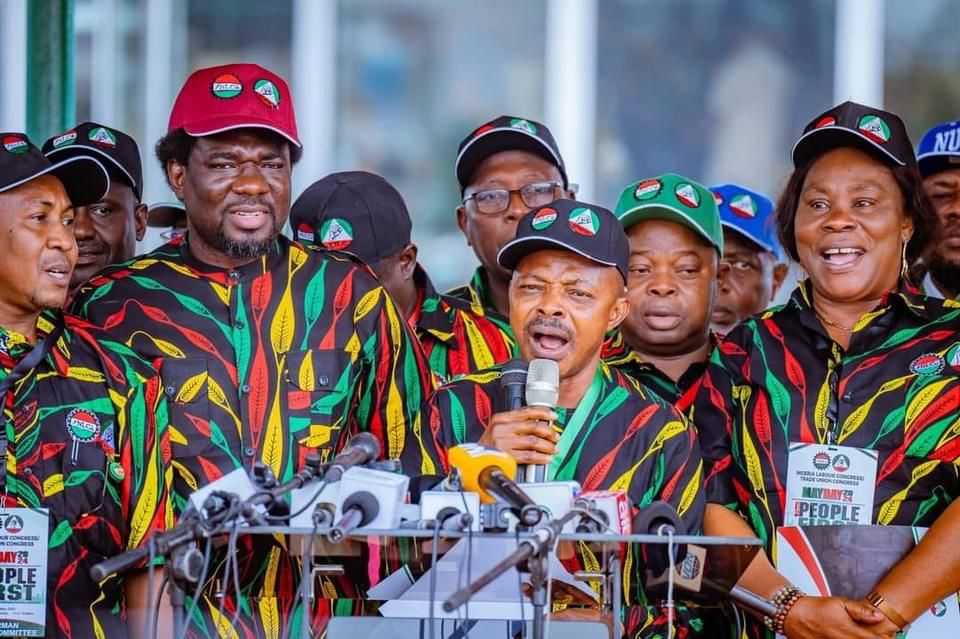
The Presidency, on Sunday, insisted that the N250,000 minimum wage clamour by Organised Labour is unsustainable, warning that the Federal Government cannot channeled all its resources to meet such a demand.
The warning comes two days after the Association of Local Governments of Nigeria raised concerns over the N62,000 being proposed by the FG.
The ALGON said if approved, the wage may put a strain on the councils’ financial burden.
On Tuesday, May 28, talks between the Federal Government and Organised Labour broke down after the government and the Organised Private Sector raised their offers to N62,000.
But the labour unions described the proposal as an insult to the intelligence of the average Nigerian worker, which deserves far better than what the government offered
Speaking in an exclusive interview with The PUNCH, the Special Adviser to President Bola Tinubu on Information and Strategy, Bayo Onanuga, disclosed that unless the Nigeria Labour Congress and the Trade Union Congress were selfish, they should consider that the resources meant for the entire Nigerians could not be channeled to only the benefit of their members who are not more than 10 per cent of the entire population.
He said, “That is why we keep telling labour to be realistic because the government cannot use all its resources to pay workers. They have other things to do. The workers we are even talking about are not up to 10 per cent of the population. Many people are self-employed or engaged in the private sector, who are not members of Labour, and are not affected by this demand.
“This is even more reason why labour has to reconsider their decision critically instead of always striving to shut down the system. What the FG did was in consultation with the private sector and others. Only Labour, which appears to be in the minority, kept saying they won’t accept N62,000. They are not even employers but employees.
“Let us wait and hear what they are going to say after their return from the ILO conference. But they have to be realistic.”
Tinubu had disclosed during his Democracy Day that an executive bill on the new national minimum wage for workers would be sent to the National Assembly.
When quizzed on when he plans to transmit the bill, Onanuga said though he could not give a particular date, he sees it happening after the Sallah break.
The presidential media aide also said the Federal Government might not meet the Labour leaders again unless something cogent turned up.
“I am not certain when he plans to do it (Bill). May be after Sallah. But I am not sure whether the FG is meeting with them or whether its position on the minimum wage has changed. Don’t forget the current amount on the table was arrived at by the committee that also has the private sector where the NECA and NACIMMA were also represented.
“That was the figure the FG delegation, sub-nationals, employers, NECA and other sectors agreed on. So, the FG cannot just decide on any other amount of money on its own without carrying these people along. And the government cannot just decide anything without ensuring that the state and local governments are able to pay,” he said.
Efforts made to reach labour leaders on Sunday were unsuccessful as close sources told our correspondents they were on their way back to the country from their recent trip to Geneva for the International Labour Organisation conference.
Meanwhile, the tripartite committee established by the Federal Government to review the minimum wage has urged labour unions to reassess their wage demands.
Speaking with NAN on Sunday, the committee’s chairman, Bukar Aji, asked labour to reconsider their position based on economic factors and the non-monetary incentives provided by the government.
Aji highlighted several incentives of the government, including the N35,000 wage award for all treasury-paid federal workers, N100bn for gas-fuelled buses and gas kit conversions, a N125bn conditional grant, financial inclusion for small and medium enterprises, and a N25,000 monthly stipend for 15 million households over three months.
He also listed the N185bn in palliative loans to states to mitigate the effects of petrol subsidy removal, N200bn to boost agricultural production, N75bn to strengthen the manufacturing sector, and N1tn for student loans, among other interventions.
Aji called on the labour unions to consider accepting the N62,000 minimum wage offered by the Federal Government.
He said the committee was trying to avert a situation where the minimum wage would lead to further job losses, especially as many businesses are already struggling.





